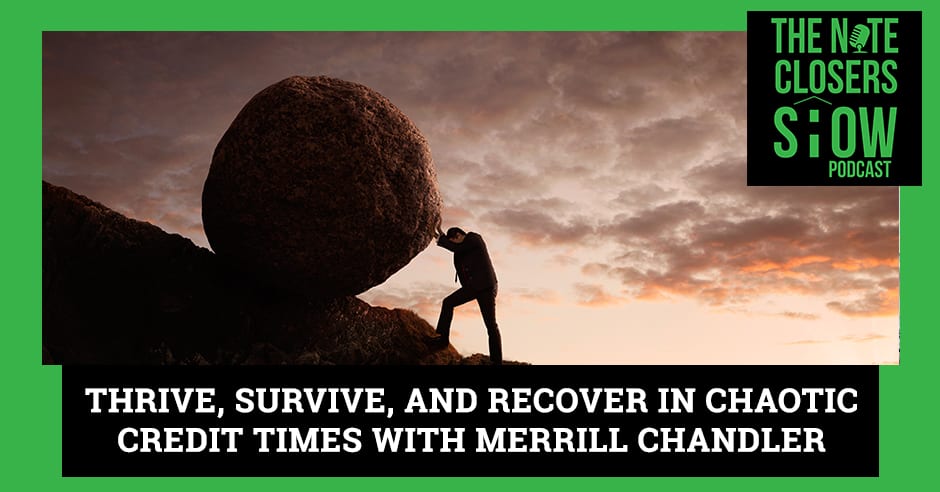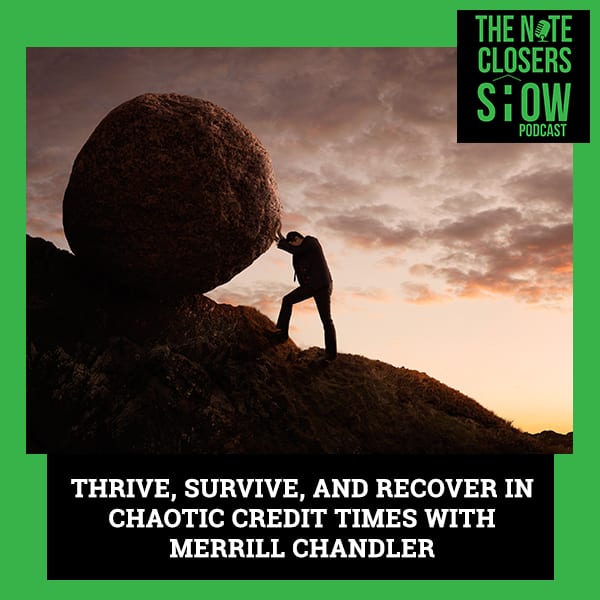
In the face of the overwhelming COVID-19 pandemic that we are all facing now, the best thing we can do is remove ourselves from fear and panic and look into what we can do to come out of it safe. In this very necessary episode, Scott Carson talks with Merrill Chandler from Get Fundable to shed light on the ways we can thrive, survive, and prosper in chaotic credit times. He shares the three fundamental principles you need to keep in mind to not only get out of the mess that is coming but also pivot to become profitable. Merrill then shares what you should and should not do with your credit profiles to protect your assets. Prepare yourself for a soft landing in these treacherous times with this great conversation.
—
Watch the episode here
Listen to the podcast here
Thrive, Survive, And Recover In Chaotic Credit Times With Merrill Chandler
In this episode of the Note Closers Show, we’re going to be talking about the three fundamental principles of survive, thrive and recover from this pandemic and the mess that’s coming as a result. Do not miss this episode.
—
This is probably going to be one of the most valuable episodes you can read because we’ve got our awesome return guest, Mr. Merrill Chandler, joining us here again. We’re going to discuss something that many of you are going to be interested. We’re going to be discussing the three pillars of pandemic pivoting to make sure you’re profitable. I can throw another P in there if I can think of it. Profitable pivot to find funding piece, maybe who knows. As always, I’m glad to have you here from the GetFundable.com and the Get Fundable! Podcast. Everybody, Merrill Chandler. What’s going on, Merrill?
There are at least seven Ps in a row. That’s the Pandemic, Profitability, and the Pillars to make sure that you don’t pause in your potential program to prosper. I’m glad to be here. I love it and your audience. We’ve got some great things to talk about. We are pivoting like mad people. I am on the third of a four-week sprint where we’re reshaping and retargeting all of the vast amounts of tech, our FICO relationships, the coaching we’re receiving, and how we can prepare our audience, the real estate investors, and entrepreneurs to slingshot their way through and after this oncoming recession. I’m so thrilled to be here.
You had your largest online class so far. Those are some new things that we’ll talk about. Let’s dive into those three pillars that we were talking about beforehand. A lot of people out there are coming from a spot of fear and panic of not knowing where to go and what to do. They’ve been laid off from work, cut back, furloughed or their hours have been dramatically reduced as they’re online or working from home. One spouse is not working and they’re trying to cover everything up here. Why don’t we dive into that first and foremost?
One of the three pillars is thrive. How do you thrive? Some people are prepared. Some people are in either cash and liquid asset position. They learned from previous recessions, especially in 2008, what it takes to thrive. Even though this reset we’re going through may be bigger than 2008, none of us thought for a second that it would be started or precipitated by a health pandemic. We all knew there was a real estate reset, but we didn’t know that it’s going to be a complete recasting of the marketplace based on a health pandemic.
How to thrive? What are the strategies to be able to be ready to acquire the business credit so you can take advantage of the things that aren’t going to be available here? Whether it’s 6, 12 or 24 months, it is coming. We are going to be able to acquire more assets. Some of us may not be quite in the thrive category. We’re looking to survive. People have been furloughed. There was a new number out that 50% of people who have three-person households that make about $37,000 a year have or know someone who has been laid off. That is huge. It’s not a V recovery. It’s going to be more of an L recovery. How do we survive? How do we protect our credit? Even if we’ve been laid off, what are the ways that we can do to take care of our families and our loved ones, and protect the greatest asset we have, which is our financial relationships with lenders and our financial reputation?
The third is for those of us who aren’t quite able to even survive and are sliding down the slippery slope. We’re ready to have a 30-day late in collections. Those things are coming at us and there are a certain number of people where it is true. The $1,200 we got from the piecemeal distribution is not going to pay our mortgage, rent or car payments for more than a month. We want to be able to recover. How do we do a soft landing? How do we establish ourselves in a position where we can have a soft landing and still maintain a relationship with our lenders that we can recover quickly after we get back employed and back on our feet? How do we minimize the negative impact? Thrive, survive, or recover quickly. Those are the three pillars. I’m on a mission. We’re broadcasting this everywhere we can because we all fit in at least one of those categories.
Let’s dive into the survive category first. Many people realize we’re going to see nonperforming. I’m already getting bombarded by banks and lenders asking me if I want to buy their performing stuff at a bit of a discount.
We haven’t even started this process yet.
It’s like, “Are you buying? Do you want to buy our stuff?” I’m like, “No, you still want too much for it. I need a little bit more.” Just because I haven’t gotten a haircut in a month doesn’t mean that you don’t deserve a haircut in a month, but not quite a buzz cut. Let’s talk about that survive aspect. For our readers out there that are laid off and don’t have the money coming in, what are the things that they should be doing?
The first thing we want them to know is your behavior is being measured by the borrowers. If you’ve listened to any of my podcast or Scott’s podcast, we’ve talked about borrower behaviors. Your behaviors include paid as agreed, paying on time, and things like that. If you’re going late, not even 30 days late, you’re not delinquent yet but if you’re trying to scrape together the money, family and friends are helping, whatever is going on. If you’re 1, 2, or 3 days late, they’re able to measure that there is something not right in River City. They’re measuring this. Know that your lenders know where you are. The first and most important thing in survival mode is communication.
The problem with communicating with your lenders is the whole time is unbearably long. Start a game of Chess or Monopoly. A game of Scrabble is not long enough. Get on the phone and talk to them. The key is to get your situation into the notes. You want to tell them, “This is what’s happening. I’ve been laid off. I want to do right by you.” Communicate that you want to honor and respect the money they have lent you whether it’s a mortgage, an auto loan, a student loan or your credit card payments. We’ll talk about the types of loans that have exceptions. You want to establish a documented relationship that you are consciously aware. The way this system works is if you’re letting your 30, 60, 90-day late collections and all that stuff, then you’re going to be part of the machine.

Thrive And Survive: The longer you can wait for your lenders, the more you’re showing them that you are partners who are in this together.
If you are in the risk department and you are communicating with your lenders, you’re likely going to be a special case. More considerations and more options will be available to you than those who are letting something die a slow and painful death. When it comes to survival mode, let’s talk about student loans. Student loans have been given a moratorium both on interest being charged. No payments are due on student loans and no additional interest is being charged.
Part of the survive, if you have the resources and you can still make some of these payments, this is a great time, and again it requires communication. Some of you have student loans where the interest is above the original loan amount because it’s been in deferment or whatever. You can use the money and this time period to pay down some of the interests and get it under that 100% loan amount because that’s counting against you as well. That’s a wonderful survival because you’re sending a message to the lender, “We’re not charging anything and they’re making payments to put their house and their relationship with us in order.”
Let’s go to auto loans. Auto loans are fire sailing. This 0% interest has always been a thing, but in everything that I’m looking at, it appears that they’re even lowering the standard for 0%. Instead of a 740, it’s a 720 or 710 credit score in order to get the 0% financing. Go to my bootcamp to learn how to make sure that you’re not being taken advantage of because they’re fire sailing these cars. What they’re counting on is making money on the back end because you don’t know this game. They’re going to make a crap load of money off of you by the type of approval they give you. There’s a whole thing about this. If you’re surviving and you need to buy a car, if that’s part of your game plan, you’ve got to go to GetFundableBootCamp.com and register for the bootcamp. There’s one nearly every month. You need to learn how to save money on the financing, not just save money because they’re giving the cars away. That’s part of your survive. Some lenders are allowing the forbearance of auto loans or otherwise.
This is where the path diverges. You need to know which one you’re going to look at. Number one, if you do not have to use a forbearance or payment deferment, you’re going to strike much higher on their fundability charts when coming out of the recession. You’re going to have more opportunities later because you have their back during the times of stress and pressure. Think about it. Every one of us have relationships. Every one of us knows that when our spouse, partner or business is under stress, that’s when we’re the worst human beings. Generally speaking, we’re horrible. The greater the stress, the more aggravated we can be. The bottom line is lenders are measuring this behavior. If you show up, you have their back. Remember, they gave you money. It isn’t some institutional thing. They’re measuring the quality of your relationship with them.
If you have their back, if you treat their money with deference and respect, and you don’t need to take advantage of the moratorium to survive, don’t do it or wait as long as you can to do it. It’s not going to go away for a minute and everybody may get six months where that six months is now or later. I would defer. Your survival strategy is to defer as long as possible or wait as long as possible to take advantage of those programs. They’re not going to go away, but the longer you can wait, the more you’re showing your lender that you guys are partners and you’re in this together. It may sound strange to something as impersonal as Chase, Wells Fargo, or whatever, but the algorithm that is measuring your behavior is not impersonal. It is dialed to the nth degree about how you are showing up in this relationship. If you can avoid the mortgage deferral, the loan deferral or any of those things, do it for as long as you can.
Part of survival is keeping food, a roof over our head, and money in our pocket to take care of the needs of our family and our loved ones. Execute these offered strategies if you need to. Only you can know when that’s going to be and when to use that. Survival now is being able to thrive later or next. Choose wisely on how to do this. Remember, whenever you can pay by the due date and time that your credit card, car loan, or mortgage is due. Pay it by the due date and time, because that will continue to show that you’re on it even if the world is falling apart around you.
Having said that, I also know people who pay their mortgage, keep their credit good and all those things, they’ve gutted their IRAs and their retirement plans in 2008, and were left destitute. I’m not saying do that. What I’m saying is come to the bootcamp and find out how to navigate these waters. This is my third big recession. I’m not even counting the dot-com crisis. That’s just an oops in the market. Find out how to navigate these waters because the more you protect your relationship with your lenders, the more they’re going to lend to you when we come out of this. As what Scott was saying, they’re already fire-selling properties, papers and notes. Get in a position to take advantage of this. That was a long answer to a short question.
You covered a lot. Defer the deferment as long as you can. The forbearance is great. That’s the thing people need to know that deferments mean that you don’t have to pay for 90 days but when you do go back in 90 days, you’ve got to pay the full 90 days versus a forbearance agreement. It’s a totally different philosophy.
Make sure because some of the big banks have advertised and it will say current or paid as agreed. I’m going to give you that. In fact, the Federal Consumer Protection Bureau, FCPB suspended the law. Most people don’t even know. They think it’s just the Bureau doing their thing. There is a law that states that you have to report the activity and then you can negotiate to have an item removed or whatever, but they’re supposed to report the activities. It can’t be just the will of the wisp like, “I’m going to report these guys.” They suspended that regulation so the bureaus wouldn’t be breaking a law to not report the truth that you missed a payment and it’s not technically paid as agreed.
All that had to happen in the background for us to be able to get these deferments or this renegotiation. The other thing is be careful that your bank has in writing that if you take advantage of a deferment or a moratorium on the payment, interest is still accruing or if the payment is added to the background. That’s what most of them are doing. Whereas, the student loans have no charges on interest, no payments, and none will be added to the back. Make sure what the terms are of your deferral or your moratorium. Once you know what you’re talking about, make sure it has in writing that it’s paid as agreed or current. I’ll put a slash in there because different bureaus report differently. Will it say paid as agreed or will it say current?
If they’re willing to do that, then it’s safe. Before they started announcing that I was the other guy yelling, “Make sure what the rules of engagement are so they don’t say, ‘Don’t pay, and you get a 30 day late.’” It’s been beneficial and they’ve been awesome. The banks are being proactive because they don’t want another 2008. They closed down the markets. They stopped lending for nearly sixteen months. They don’t make any money. We need to keep this partnership going with borrowers and lenders.
I used to be a banker for JP Morgan Chase. Most people might know that or don’t know that. Before I was a mortgage banker on my own. I was a banker for Chase for three years. I did well. I’m a top banker of all of Texas. It’s a big state. I’m still friends with the regional vice president or the Texas manager, the guy that manages all of Texas. In 2008 and 2009, you said eighteen months, they did not approve a single commercial loan or commercial line of credit in all of Texas to anybody. They were like, “We’re going to hunker down.” Going back to Chase, Jamie Dimon, a big honcho over there says he expects to see the next few years to be similar as it was in 2008, 2009 and 2010. Not only with the unemployment losses, but some of the defaults that we’re seeing and expecting to see out there. You need to be heeding this advice that Merrill is giving you because it’s valuable. We’re going to do an episode here, It’s 2008 All Over Again. What would I do if I go back and do things differently?

Thrive And Survive: The more you protect your relationship now with your lenders, the more they’re going to lend to you when we come out of this.
You now have that exact opportunity to do it differently. Be positioned. We were able to help many clients to be able to thrive or to break-even. When I say break-even, no credit loss and no credit gain, but just stay alive and keep their current status. There are formulas on how the lenders are going to lower your credit limits or completely close accounts. It’s called the FSSI, the FICO Score Stress Indicator. This is why we have to know what the rules of engagement are, so we can dodge these bullets, know what the insider secrets are, and what they’re measuring. We can behave in a way that keeps our credit lines open and get new credit. Think of fundability and getting funding approvals as a target. If you’re not fundable, regardless of the financial situation of your personal life or the world, you’re not going to even hit that target. That’s what denials are. If you’re fundable, it’s a little sloppier. You can hit the outer rings of this target and still get money. They may be lower limits or test limits, but you’re still getting funded.
We help people build personal and business fundable targets where your scatter chart is the first two rings and the bullseye. If you’re not hitting that bullseye, you’re not going to get funded in a recession, but you will get funded like mad if you are in that tight scatter chart for your fundability. That means you’re doing all the things. That’s the thriving part of this. Tighten up your borrower behaviors and lenders will continue to lend. They want to lend to safe borrowers. There’s an entire new FICO algorithm that measures how much stress you’re under. We happen to have the inside scoop on that as well. That’s what we need to do to make sure that we’re now what I’m calling bullseye borrowers. If we’re bullseye borrowers, lenders are going to keep giving us money and we could prepare to swoop all of these performing notes and nonperforming notes. Whatever your wealth strategy is, you’re going to be able to execute on it well-capitalized.
The target is what we need too. A question for you. If somebody is sitting out there and they’ve been through a rough time, they’ve got a balance in their credit card, and some outstanding debt, would now be a good time to reach out and try to negotiate that down on a discount?
I’m preparing an entire section of the bootcamp. We call it the Recovery. These are great recovery questions so let’s talk about that. First of all, I call it a degradation process. The paid as agreed account starts degrading if we don’t make the payments. It goes 30, 60, and 90. Somewhere between 90 and 180 days, it goes to the collection and it goes to judgment. Depending on your financial situation, you may go to bankruptcy. There are soft landings and strategies to minimize the negative effect at every single one of those stages by being able to communicate with your lender and being able to navigate.
One freebie that I want to give everybody is if you are going to settle for less than full balance in a particular card because you’ve got the money now but you’re trying to negotiate it, the language you want to read on your credit report is “settled in full,” not “settled for less than full balance.” Settled in full will give you more opportunities. That language won’t burn your relationship when the lender is looking at you in the future. If it’s settled in for less than full balance, many times they’ll keep you on their blacklist or what we call the burned list and they may not offer you money until you pay the difference.
There’s an entire strategy where the bootcamp is going to be sharing about how to protect yourself and how to do a soft landing. Most people go to a bankruptcy attorney in order to find out how to do a bankruptcy. Since a bankruptcy attorney is a hammer, everything is a nail. That’s the only solution. There are bankruptcy alternatives, depending on your situation where you don’t have to burn the relationship with the lenders. If you do a bankruptcy, here’s something that nobody knows. Most people believe that because the law says that you can do a bankruptcy, that when you come out of that bankruptcy X amount of time, even if the bankruptcy falls off ten years later, that the bank can lend you money again. No, you burn that bank. Just because the law lets you be forgiving of the debt, “I forgive but never forget.” That’s exactly like the lenders. Lenders are not going to give you more money in the future until you’ve made it right with them from the past even if you are legally able to absolve yourself of that debt.
Be careful about throwing around the bankruptcy word because there are bankruptcy alternatives that allow you because you’re in communication, you’re treating their money with deference and respect, and you’re being honest about your circumstances. There are ways in which you can, in every step of the downgrading process, insert yourself with comments, risk department narratives, and be able to keep your relationship at least with a heartbeat. It may not be a big heartbeat, but it’s not dead. You can then navigate and build that relationship with better results in the future. That’s what we call a soft landing. Don’t just go throwing around bankruptcy. That is a ten-year event and no one’s going to lend business lines of credit, commercial loans, and real estate.
Legally, real estate takes three years before Fannie and Freddie will backstop a bankruptcy or approve somebody that went through a bankruptcy and it’s based on other factors as well. Those lenders aren’t going to give you a penny if you burn them or their sister company. If you burn Bank of America, Wells Fargo will look at you and go, “You didn’t treat my sister bank over here well.” We’re whitelisted, greylisted, or blacklisted. You have to know where you’re going to end up if you make these decisions so be careful.
Go to the bootcamp at GetFundableBootcamp.com and find out what the rules of engagement are. I don’t want to cast it as a war because that’s what rules of engagement usually sounds like. It’s not a war. How do we do a legal separation from our partner that is the lender? That’s what we have to negotiate with them? How can we come back together and be productive partners again at some point in the future? That’s the recovery side. We’re talking about how to evaluate a credit repair firm. What does credit repair do for you versus fundability optimization? There’s a whole slew of things that people are going to be facing and we want you to be educated on what that means.
That’s great insight there because some people don’t realize and they say, “I can get a loan straight out of bankruptcy.” You could but you’re not going to like the interest rate or what you’ve got to bring to the table as a down payment.
It’s going to be a tier-four loan. It’s going to be a predatory lender who knows how to appeal to your, “I need to build a new credit profile.” If you have tier-four loans on your profile, tier 1, 2, and 3 are not going to look at you. You’re going to be creating a FICO negative indicator that will follow you for ten years. Even if you didn’t do a bankruptcy, it follows you for as long as that account is reporting on your profile. It’s not good. You’ve got to know what they’re measuring and what you can do about it so you can navigate these treacherous waters.
What if somebody finds themselves with their accounts or lines of credit have been declined or reduced or closed? What are some things they would do? I don’t want to take too many secrets away from the bootcamp.

Thrive And Survive: Tighten up your borrower behaviors, and lenders will continue to lend.
We’ve got to know this one. First of all, when I met with the Chief Scientist at FICO, Ethan Dornhelm, Brad and I asked this question specifically. We were meeting with him in 2016, 2017, 2018 and 2019. When a bank reduces a limit, let’s say you’ve got a $20,000 limit and a $15,000 balance and they reduce it to $10,000. Normally, that’s over-limit and it’s horrible on your fundability. It kills your profile and your score. We asked, “When you’re over limit, do you account for that if it’s part of a recession or part of the thing?” He goes, “Nope, because if you’re what we call a professional borrower, if your performance data is in alignment, they’re not going to reduce the limit. You’re doing something that is causing them to protect themselves against you.” As I always say, “We’re in charge of our own approvals.” We’re in charge if we know the rules of the game and if we know about the behaviors that we’re doing.
If they reduce a limit and you’re over limit, your old balances now is over the new limit, you’re getting killed in future fundability. We have what is called Doomsday Protocols. We introduced it in this last bootcamp the first time. Doomsday Protocols about surviving. We didn’t have the time because it was a two-hour section of the bootcamp. When you implement Doomsday Protocols, you can use your current cashflow and/or assets. Imagine if your financial reputation is the most important asset you have and you’re sitting on some properties and you’re like, “I don’t want to let go on my properties,” thinking that it’s okay to trash your financial reputation to keep on to a house. I’m telling you now, the house is easier to reacquire than your financial reputation. Liquidate a property and lower your limits. In the bootcamp, we talked about knowing the difference between what gets reported on your personal profile versus on your business profile.
You’re ratting yourself out if you’re carrying balances. Even if it’s a fix and flip, buy and hold or whatever it is and you’re putting things on your personal credit, you’re going to get caught with your pants down at some point. We’ve got to make that move over to true business credit. A Spark Card and a Discover it Business are not the answer because it reports to your personal. I know I’m way off in the weeds now. The point is, you’ve got to know what’s going on. I’ve been telling my clients, “If you are liquid or if you have one property that you can liquidate, you’re not going to get everything you wish you could out of it. However, it puts another $10,000, $20,000 or $50,000 or more in your pocket to put your financial reputation house in order. I’m telling you, it’s the greatest thing that you can do.”
The next thing I tell people to do is put three months minimum, six months preferable and if you can afford it, twelve months of prepayments on your mortgage, your car, your student loans, and don’t put it in a savings account. Put it as credits on your loans. Those credits on your loans are going to be lifesavers because they feel safe that they get to tap your money to take care of your payments. There are many strategies we’re going to be talking about in the bootcamp on what to do when you get out of the bootcamp to do and take care of it.
That house, if you have to sacrifice something on that asset, I use the example, it’s easier to sell a yacht than to ruin your credit and never have a yacht again. If we have to contract, let’s contract intelligently and deliberately to protect your reputation. That’s the bottom line because your reputation is going to put money in your pocket for years to come. We’ve got to protect it but not give away all of our cash to survive if it comes to that. That’s why we have the three areas, thrive strategies, survive strategies, and recovery strategies.
That’s a big thing. There will be a lot more assets and yachts that you can get for a lot cheaper. I’ll tell you a funny story. In 2010, I was down in Florida. I spent a big chunk of time down in South Florida, around Miami, around Naples, and Marco Island. It’s a high dollar rent down in Marco Island. I started getting bombarded especially from Ocean Bank with lists of notes on boats in dry docks. Boat storage companies who were storing and people weren’t paying the rental fees or storage fees each month. They repo the boat and sell the boat off for a discount.
I flipped a couple of boat loans that we saw, but boats are one thing that don’t work well if they’re not being operated. That was the biggest thing. If it’s not being operated a lot of people go in and rip out the radio and the satellite stuff. A boat that has not been operated since it’s still on water deteriorates and depreciates the asset. If you’ve got a yacht now and you’re overpaid, you might get it sold because you can always go back. As they say, the best two days in any type of boat owner’s life is the day they buy and the day they sell their boat.
I heard a different way. If it flies, floats, or something else, rent it. That’s my go-to. There are many powerful things that we can do to protect and insulate ourselves from the loss that will help us. It’s like sweeping and cleaning our financial house and we’re ready to go back at it again. All of this is a calculated retreat. I call it a deliberate and strategic contraction, then we start growing again. You’ve heard me say this before, your financial reputation. I’m not talking about your credit report, I’m talking about your relationships with banks and your reputation with your vendors, your sales, the people in your lives that you buy homes and notes from, etc. Treat them with deference and respect. Communicate and we can leverage those relationships for a massive win over the next few years.
You’ve tweeted the bootcamp a little bit. Let’s talk about that.
It’s a Friday and a Saturday. We had over 100 people in our last one and the demand is high because people are like, “What do I do?” We had one group say, “I’ve heard you three times. I thought your presentation was awesome. I want you to talk to all my real estate. They got us down in LA.” Credit isn’t just a nicety because people are doing their own thing and building their real estate businesses. It’s like, “How do I save my soul?” That’s why we’re pivoting on the bootcamp and making sure everybody has the tools to thrive, survive, and recover. It’s a soft landing. It doesn’t have to be ugly.
The Three Pillars of Pandemic Credit is what we should probably call this episode. You’ve been busy. That’s a Friday and a Saturday. Do they get signed up online?
Have there been any surprises that have popped up? I thought of something that I wanted to ask you about. JP Morgan Chase forgave and closed all their credit cards for all their Canadian clients. They literally forgave the debt like that, “You don’t owe us anything anymore and we’ll refund your most recent payment back.” Do you think anything like that will happen here in the United States with anybody?
The difference between Canada is the banks are nationalized in Canada. It’s like there’s a mama bear and there’s an elk coming in to forage in the same woods. It’s a weird metaphor. I believe that was part of the structure because first of all, it’s a write-off for Chase. Chase is going to be able to not pay taxes for however many millennia with these moves. The money was lent from the United States but to people who are spending it mostly in Canada. I do not know if that’s going to occur here because our banking system is not nationalized. That would occur likely and only if the federal government or the Feds say, “We will compensate you.”

Thrive And Survive: Your reputation is going to put money in your pocket for literally years to come.
Notice that the mortgages, Fannie and Freddie, you don’t have the payment moratoriums broadcasted as much when you’re on the double jumbos for their portfolio loans for Chase or Wells. You’re getting it for your Fannies and Freddies because they’re being backstopped by the Feds. If the Feds were to say, “Backroom conversations are too big to fail. We will compensate you for a principal and/or interest if you say, ‘Forgive the debt.’” That is the only scenario that I see that would happen. This is not a political statement. I’m not a politico. I found it funny that there were individuals who were running for office saying, “Everybody needs a national income.” One month later, a pandemic sweeps the country and now we have a national income either through business. People are saying that we need to do this for several months in a row.
Neither here nor there but I find it interesting that our entire national perspective will change based on keeping everybody afloat and in the game. Part of the reason why we’ve never hit the aggravation of the depression level wasn’t the same percentage loss in the markets. It’s our ability to communicate, travel, and move. We are so much more connected that we can rebound more. I can make a call or get online to Amazon and buy a new thing today over yesterday and keep things moving. Back then it was cars, food and it was an agrarian society. We were not connected at all. That’s why it was a true L recovery. It was long and we had to go to war to get out of that one.
I believe that’s the connective tissue. The Feds may come in and say, “We did it with Fannie, Freddie, and student loans. We’re backstopping those. We’re going to do a $5 trillion payout to the markets.” Everybody stop paying their things for 6 or 12 months and it will be auto loans or whatever the banks are carrying. I don’t see it not happening. I know that it won’t be the same way that they did in Canada because Canada has a nationalized banking system. Now you’ve got foreigners who I don’t know if they’re being told to leave, but it was like, “Get out of here. We’re drawing a wall against American and perhaps even the banking system until this sorts out.”
It will be interesting to see what’s going on there. I’ve noticed immediately and you’ve mentioned a couple of things. I’ve had more emails from our mortgage origination buddies and companies that are talking about, “We’re no longer doing jumbo loans.” Now, instead of requiring zero reserves, we want 6, 12, or 18 months of reserves.
Before we’ll cover it because there’s no federal backstop. Fannie and Freddie are taken care of. If they keep writing loans, it’s because the Feds are telling them that we’re open for business and we want to keep people moving into their homes or taking advantage of lower interest so their payments are more manageable. I do not like to celebrate things that are harmful to my neighbors, friends or tribe, but when we’re prepared and know the rules of the game, all of this becomes fascinating. It becomes a chess game. What’s the next move? What’s our next move? How do we know the lender playbook and anticipate their moves? This is awesome when we know what game is afoot.
Merrill, what’s the best way for people to get signed up or connect with you who are reading this maybe for the first time?
I’m going to rattle this off because I’ve got something for everybody for free at GetFundablePodcast.com. It’s free of charge, just start listening to stuff. Some of it may not necessarily apply here that’s why I refer to the bootcamp. For $8.77, I believe it is what the shipping cost is. I’ll pay for the book. Go to GetFundableBook.com or GetFundable.com. You will be able to see the podcast, book, and bootcamp links. Go to the bootcamp. If you’re in a position to thrive, find out how to thrive according to what lenders are going to lend to now, not what they’re lending to a few months ago. If you need to survive, come and get your doomsday protocols in place so you know how to make this happen for yourself and at least break-even credit-wise. If you’re already on that slippery slope, come and find out how. It’s worth it and inexpensive. Come and find out how to prepare yourself for a soft landing so you can recover quickly and take advantage of what’s happening. Do something because this is going to be bigger than 2008. I believe it.
You’re hitting the nail on the head there, Merrill. I agree with that too. We’re doing things here to take advantage of that. I love what you shared with us. We should read that and take heed from the credit messiah, as we like to call Merrill. I’m going to create and put your face on Jesus’ body.
That might be a little far for our beloved Christian friends, but do know that messiah or not, your fundability is your salvation financially in this world. Do prepare to take care of that. Make sure that you’re ready. Around the office, we call it the zombie apocalypse. Make sure you know how to thrive, survive, and prepare for a soft landing. Please, I don’t want to catch you mid-slide if we could prevent it all now.
Thank you so much, Merrill. Guys and gals, go and take some action. Tap into the resources he’s provided there. Get signed up for his next two-day bootcamp. You will love it. It will be two of the most impactful days. I say this not only as a friend but also as a client of Merrill.
You’ve been to how many now? You check in all the time.
I’ve been to at least 3 or 4. I know.
I love it and they’re never the same because this is a moving target. What FICO is measuring here, what lenders are funding here, and what’s going to save your skin depends on where you are in the spectrum. Let’s find out where you are and solve it.
Check out GetFundable.com. Guys and gals, thanks for reading and we’ll see you all at the top.
Important Links:
- Mr. Merrill Chandler – Previous Episode
- Get Fundable! Podcast
- Jamie Dimon
- Ethan Dornhelm
- GetFundablePodcast.com
- GetFundableBook.com
- http://GetFundable.com
- http://GetFundableBootcamp.com
About Merrill Chandler
 Over the past 25 years, Merrill has been a pioneer in Fundability Optimization™. He’s leveraged his extensive knowledge of borrower behavior profiles, FICO® scoring metrics, and lender underwriting requirements, to create a system for helping real estate investors and entrepreneurs become more fundable. To date Merrill and his team have helped their clients with over $103,000,000 in fundings!
Over the past 25 years, Merrill has been a pioneer in Fundability Optimization™. He’s leveraged his extensive knowledge of borrower behavior profiles, FICO® scoring metrics, and lender underwriting requirements, to create a system for helping real estate investors and entrepreneurs become more fundable. To date Merrill and his team have helped their clients with over $103,000,000 in fundings!
Love the show? Subscribe, rate, review, and share!
Join the Note Closers Show community today:

